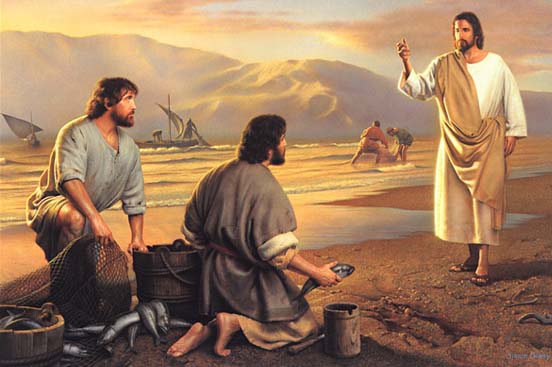Sabbath School Lesson for December 21-27, 2024
Overview and Introduction to Lesson 13, Epilogue: Knowing Jesus and His Word
Memory Text: ” ‘You search the Scriptures, for in them you think you have eternal life; and these are they which testify of Me.’ ” John 5:39 NKJV
It seems the disciples were totally unprepared for the event of their Master’s death and resurrection, right up to the very end of His time with them. And yet, Jesus had spoken multiple times of how He would leave them to go back to His Father. Sadly, they didn’t take Him at His word. His warnings fell on deaf ears that could not process what was about to happen at Calvary.
We, too, often fail to take Jesus at His word–to recognize Him as the Word made flesh–as we read about His remarkable ministry and sacrifice in the Gospels. Jesus was patient with His disciples back then though, and He is equally eager to help us understand the tumultuous times we are now experiencing before His Second Coming.
Like the disciples, we must learn not to have head knowledge only about Jesus, but to have heart knowledge about all He has done, is doing, and will do for us in the future. He is longing to be the Light and Life that will guide us to the Promised Land.
We can see the way to abide in Him by exploring these themes:
- Sunday: Meeting at Galilee–How did Peter overcome his failure of denying Jesus?
- Monday: Keeping Your Eyes on Jesus–Why should Jesus be our only focus in this world?
- Tuesday: Light and Darkness–What is wrong with depending on our own resources and perspective in understanding truth?
- Wednesday: Theology From “Above” or From “Below”–How do we know what theology and beliefs we can trust?
- Thursday: Abiding in Jesus–Why is it so hard to abide in Jesus?
Sunday: Meeting in Galilee
The last chapter of John brings to our attention an important opportunity Peter was given to experience God’s abundant grace, after his disappointing denial the night of Jesus’ arrest.
The resurrected Jesus called to the disciples from the shore, reminiscent of His initial calling of the fishermen to follow Him at the beginning of His ministry. This time, after hauling in a great amount of fish when they obeyed Jesus’ command, Jesus is seen on the shore, making breakfast for them. John recognized the stranger as the Lord Himself, and Peter jumped in the water and swam to shore.
During the course of the meal, Jesus asked Peter three times if he loved Him. Jesus used the agape form of love in the Greek, which is the highest kind of love, but Peter answered him using phileo love, the kind of love you have for a friend. In all humility, Peter knew by then, that his love was not of the highest measure.
At last humbled by his previous failures, Peter’s relationship with Jesus was restored with that encounter, and he went on to be a devout and respected leader in the early church.
Bible Verses:
John 21:1-14
- Why do you think the disciples did as the stranger asked and cast their nets in the water again?
- Why might we expect John to be the one who recognizes Jesus first?
- What does Peter jumping in the water to get to shore quicker tell us about him?
- Why do you think Jesus prepared the meal for them on shore like He did?
John 21:15-19
- What did Jesus mean by telling Peter to “feed my lambs” or “feed my sheep”?
Monday: Keeping Your Eyes on Jesus
After establishing Peter’s love for Jesus, and being told three times to “feed my sheep”, Peter was given a prophecy about his future that indicated he would die the honorable death of a martyr.
Recognizing the competition of Peter and John in vying for a favorable position with their Master, Jesus was not surprised to hear Peter ask about the future of his rival John. Jesus shut that conversation down quickly, however, by reminding Peter to keep his eyes on his Lord, not his fellow disciple John.
The response of Jesus about John: “If I will that he remain till I come, what is that to you?” was misunderstood by some early Christians. They mistakenly believed that Jesus would come before John died. But John knew and tried to explain His statement by reminding Christians that Jesus only meant that John’s future was not what Peter should focus on. Following Jesus, no matter what happened to each of them, should be their only objective.
Bible Verses:
John 21:20-22
- What may have made Peter wonder about his fellow disciple John?
John 21:23-25
- How did John try to explain that Jesus didn’t mean that John wouldn’t die before Jesus returned?
- What was the danger in having that false assumption?
- What was Jesus really trying to convey to Peter and to us?
Tuesday: Light and Darkness
John often referred to the difference between light and darkness. By declaring repeatedly that Jesus is the Light, we are warned that darkness will prevail in this world, as long as we reject the Light.
The Light exposes our sins. But some will always prefer to remain in the dark, even though it causes them to stumble blindly through life, continuing their rebellious behaviors and reaping the consequences of them.
Many of us, even Christians, try to tackle life’s problems with our own resources. We see in the Scriptures a verse that appeals to our senses, based only on our own perspective and desires. Instead, we first need to be surrendered and obedient, asking the Light of the world, Jesus Christ, to interpret His word, even when it may “step on our toes” and expose our mistakes.
Bible Verses:
John 1:4-10, 3:19-21, 5:35, 8:12, 9:5, 11:9-10, and 12:35
- Why does John so often mention Jesus as the Light?
- How can we have Light to guide our way, even after Jesus has gone back to heaven?
John 8:42-44
- Why do some prefer darkness?
- Why is the devil a dangerous one to follow?
Wednesday: Theology From “Above” or From “Below”
Jesus, from the start of His ministry, tried to show us the importance of having faith, as we try to know God and build our lives on His word. The example of the nobleman from Capernaum, who asked Jesus to heal his son, shows us the importance of having a theology based on our faith, not on the evidence or signs alone, as Jesus pointed out to the troubled father (John 4:48).
We know our human ideas are subjective and unreliable and will vary from person to person. They may even change suddenly, depending on our current mood and circumstances. When we use our human perspective and ideas as a basis for our religious beliefs, and only believe what we have solid, earthly evidence for, we are basing them on things from “below”.
Instead, we should allow our love and faith to guide us into obedience of God’s word as we know it (John 14:23). When this process of faith is initiated in the believer, the Scriptures will interpret themselves and we will get the most benefit from its instruction. If we aren’t getting our theology from “above” and a faith relationship with Jesus isn’t pursued, our belief system can quickly become legalistic and superficial.
Bible Verses:
John 4:46-54
- How was the nobleman shown that Jesus’ word alone can do miraculous things?
John 7:17
- How does a desire to do God’s will help us understand the Bible?
Thursday: Abiding in Jesus
John 12:32 tells us that if we lift Jesus up, in other words recognize His divine mission to save us on the cross, we will be drawn to Him and His Father and will know the truth of His word. Rejecting the Light provided so generously will cause us to stumble blindly in the dark. Our flawed, prejudiced human arguments should not come before words that are clear in Scripture.
John 15:1-11, in describing Himself as the vine, perfectly demonstrates how we branches must remain connected to Him if we are to stay alive and grow the fruits of the Spirit. Abiding in Jesus, as articulated in this passage, includes both loving our Lord and Savior and living for Him. True joy comes when we take Him at His word and obey His commandments (John 15:10), using the power of His Spirit.
Surrendering our will to His, our theology from “below” to His theology from “above”, will ensure our path to righteousness and allow us all the inner joy, peace, and comfort we need to battle the demonic forces of the enemy. Abiding in Jesus is the result of choosing God as our commanding officer and following His marching orders, rather than our own.
Bible Verses:
John 12:32
- Why is “lifting Jesus up” considered a reference to Christ’s crucifixion?
- How does His crucifixion draw us to Him?
John 15:1-11
- What are some of the ways we can grow spiritually and remain connected to the vine?
- What happens when we sever our ties to God and don’t abide in Him, and who is to blame when that happens?
Friday: Final Thoughts
If John would have us learn anything from his Gospel about His beloved Master, it may be the concept of abiding in Jesus, truly knowing Him. The word abide is found seven times in just four verses in John 15:4-7, the passage about Jesus being the vine and we being the branches.
Without this vital connection with God and His Son, we can do nothing, John tells us (John 15:5). All our efforts to be like Him will fail, causing us to be thrown into a fire. In other words, we become fruitless branches that are good for nothing but firewood.
Jesus’ first step in coming to save us was to humble Himself and become an obedient servant. Paul explains this process of humility in Philippians 2:5-8. Paul wants us all to have a humble mind, so we can be like Jesus. Because only with that humility, in opposition to the pride we daily struggle with, can we surrender our will and be obedient to God’s will instead.
In the book The Desire of Ages we find on p. 143: “…it is through Christ, by the ministration of His heavenly messengers, that every blessing comes from God to us.” So, we must abide in Him, in other words, stay connected to the Vine, who gives us life, both now and for eternity.
Next Week: God Loves Freely (new quarter: God’s Love and Justice)
To read the Sabbath School Lesson Quarterly and see more resources for its study, go to










